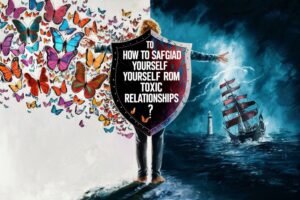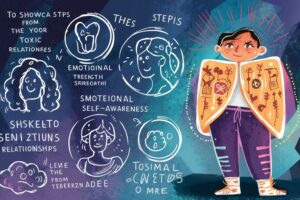How to Safeguard Yourself from Toxic Relationships?
Navigating relationships can be a fulfilling aspect of life, but not all relationships are healthy or positive. Toxic relationships can have detrimental effects on our mental and emotional well-being, often leaving us feeling drained, manipulated or undervalued.
In order to safeguard ourselves from toxic dynamics, it is crucial to first recognize the red flags and patterns that indicate toxicity. By understanding these signs, setting firm boundaries, and prioritizing our self-care and emotional wellness, we can empower ourselves to cultivate healthier relationships and break free from toxic cycles.
This article explores strategies and insights on how to identify, address and ultimately protect ourselves from toxic relationships.

Table of Contents
ToggleWhat is Toxic Relationship?
A toxic relationship is a relationship that is marked by unhealthy patterns of behavior, manipulation, control, and emotional or physical abuse.
It is a connection between two individuals that is detrimental to one or both parties involved, causing harm to their mental, emotional, and sometimes physical well-being. In a toxic relationship, one or both partners may feel constantly drained, anxious, or depressed due to the negative dynamics at play.

These relationships are often characterized by a lack of trust, communication, and respect, and may involve one partner exerting power and control over the other.
Recognizing a toxic relationship is crucial in order to take steps towards ending it and moving towards healing and growth. Signs of toxicity in a relationship may include frequent arguments, feelings of fear or obligation towards the partner, a sense of walking on eggshells, and a general feeling of being unhappy or unfulfilled.
It is important to seek support from trusted friends, family, or mental health professionals if you find yourself in a toxic relationship, as breaking free from the cycle of toxicity can be challenging but ultimately empowering and necessary for your well-being.
Remember, you deserve to be in a relationship that is healthy, supportive, and uplifting, and do not have to settle for anything less.
Read more about “What Does Love Bombing Mean and ways to overcome?”
How to Recognize Toxic Relationship Patterns?
Toxic relationship patterns can often be difficult to recognize, as they can be subtle and insidious in nature. However, there are some key signs that one can look out for in order to identify them.
One common indicator is a lack of respect and boundaries within the relationship, where one or both parties may disregard the other’s feelings or needs.
Additionally, patterns of manipulation, control, or emotional abuse can be present, creating a dynamic of power imbalance and toxicity. It is crucial to pay attention to patterns of gaslighting, where one partner may invalidate the other’s thoughts or feelings, causing confusion and self-doubt.

By being aware of these signs and patterns, individuals can take steps to address and potentially end toxic relationships, in order to prioritize their own well-being and emotional health.
Read more about “How to Identify Seductive Emotional Manipulation?”
Identifying Red Flags in Toxic Relationships
Identifying red flags in toxic relationships is crucial for maintaining mental and emotional well-being. One key indicator of a toxic relationship is a lack of trust and respect. If one partner constantly belittles, criticizes, or controls the other, it may be a sign of an unhealthy dynamic.
Additionally, if one partner is always making sacrifices for the other without any reciprocity, this could also be a red flag. It is important to pay attention to how you feel in the relationship – if you constantly feel anxious, depressed, or insecure, it may be a sign that the relationship is toxic.
Another red flag to watch out for is communication patterns. In a healthy relationship, both partners should feel comfortable expressing their thoughts and feelings openly and honestly. If one partner constantly shuts down communication, gaslights the other, or is unwilling to discuss issues and find solutions, this can be damaging to the relationship.
Additionally, if there is a pattern of manipulation, guilt-tripping, or emotional abuse, these are all clear signs of a toxic relationship.
It is important to trust your instincts and prioritize your own well-being in relationships. If something feels off, pay attention to warning signs and don’t ignore them.
Read more about “What are the Signs of Emotional Exploitation?”
Impact of Ignoring Red Flags of Toxic Relationships
Ignoring red flags in toxic relationships can have a devastating impact on one’s emotional, mental, and physical well-being. By dismissing warning signs such as manipulation, deceit, and control, individuals may find themselves trapped in a harmful and unhealthy dynamic that can erode their self-esteem and confidence over time.
Moreover, failing to address red flags can perpetuate a cycle of abuse and dysfunction, leading to feelings of isolation and helplessness.
It is crucial for individuals to recognize and confront red flags in relationships early on in order to protect themselves from further harm and work towards establishing healthier and more fulfilling connections in the future.
Early Warning Signs of Toxic Relationships
Recognizing the early warning signs of toxic relationships is crucial in maintaining one’s emotional and psychological well-being.
These signs may not always be overt but can manifest in subtle ways such as controlling behavior, manipulation or verbal abuse. Individuals in toxic relationships may feel constantly drained, anxious, or insignificant.
It is important to pay attention to any red flags, such as constant criticism, lack of boundaries, or jealousy. Seeking support from friends, family, or a therapist can help provide clarity and guidance in navigating these complex relationships.
Read more about “How to Evaluate a Narcissist Partner Behavior?”
Overall, being aware of these warning signs and taking steps to address them is essential in fostering healthy and fulfilling connections with others.

Impact of Toxic Relationships on Mental Health
Toxic relationships have a profound impact on an individual’s mental health, often leading to a myriad of negative outcomes. Research has shown that individuals who are in toxic relationships experience increased levels of stress, anxiety and depression.
The constant turmoil and conflict in these relationships can erode self-esteem and self-worth, causing feelings of inadequacy and worthlessness. Moreover, toxic relationships can also manifest as emotional abuse, manipulation and control, which can further exacerbate mental health issues.
Over time, individuals may develop symptoms of trauma and post-traumatic stress disorder, perpetuating a cycle of emotional distress and dysfunction. It is crucial for individuals to recognize the signs of a toxic relationship and seek support to protect their mental health and well-being.

Setting Boundaries with Toxic Individuals
Setting boundaries with toxic individuals is essential for maintaining your mental and emotional well-being. In order to effectively set boundaries with toxic individuals, it is crucial to first recognize and acknowledge the behavior that is harmful or detrimental to you.
This may involve reflecting on past interactions and identifying patterns of behavior that have been distressing or harmful. Once you have identified the toxic individual and their harmful behavior, it is important to communicate your boundaries clearly and assertively.
This may involve setting limits on the amount of time you spend with the individual, clearly stating what behavior is unacceptable and enforcing consequences if those boundaries are crossed.
Furthermore, setting boundaries with toxic individuals also involves prioritizing self-care and prioritizing your own needs. It is important to recognize that you have the right to protect yourself from harm and toxicity, and that setting boundaries is a way to assert your self-worth and self-respect.

It may also be helpful to seek support from trusted friends, family members, or a therapist in navigating how to set and enforce boundaries with toxic individuals.
Ultimately, setting boundaries with toxic individuals is not about shutting them out completely, but rather about creating a healthy distance that allows you to protect your mental and emotional well-being while also maintaining a relationship, if desired.
Practicing Self-care and Self-love
Practicing self-care and self-love in toxic relationships can be a challenging task, but it is essential for maintaining one’s mental and emotional well-being. In toxic relationships, it is common for individuals to experience feelings of inadequacy, guilt, and low self-esteem.
To combat these negative emotions, it is important to prioritize self-care activities that promote self-love and positivity. This can include setting boundaries with the toxic individual, seeking support from friends or a therapist, engaging in activities that bring joy and relaxation, and practicing self-affirmations to reinforce self-worth.
By practicing self-care and self-love in toxic relationships, individuals can protect their mental health and maintain a sense of self-worth, even in challenging circumstances.
Seeking Support from Friends, Family, or Therapist
Seeking support from friends in toxic relationships can be a challenging but essential step in the process of healing and moving forward. When navigating a toxic relationship, it is important to confide in trusted friends who can provide guidance, empathy, and perspective.
Friends can offer a supportive ear to listen, validate your feelings, and remind you of your worth and boundaries. Additionally, friends can offer valuable insights and observations that may be difficult to see when embroiled in a toxic dynamic.
By seeking support from friends, you can gain clarity, strength, and resilience to navigate the complexities of toxic relationships and ultimately make empowered decisions for your well-being and future.
Detoxifying Your Social Circle and Environment
Detoxifying one’s social circle and environment is an essential process for maintaining mental and emotional well-being. Firstly, it is important to assess the relationships and interactions within one’s social circle.
Identify toxic individuals who drain your energy or negatively impact your mental health, and limit contact with them or consider cutting ties altogether. Surround yourself with supportive, positive, and empowering individuals who uplift and inspire you.
Additionally, detoxifying your physical environment involves creating a space that promotes relaxation and rejuvenation. Decluttering, organizing, and incorporating elements such as plants, natural light, and calming colors can help create a peaceful atmosphere.
Practicing mindfulness, setting boundaries, and prioritizing self-care are also key components in detoxifying your social circle and environment.
By taking intentional steps to cultivate a healthy and positive environment, you can enhance your overall well-being and cultivate meaningful relationships.
Ending Toxic Relationships with Grace and Assertiveness
Ending toxic relationships with grace and assertiveness requires a delicate balance of self-awareness and boundary-setting. It is important to first acknowledge and accept the toxic nature of the relationship, recognizing that it is not healthy nor beneficial for either party.
Then, assertiveness comes into play as one must communicate their feelings and needs clearly and confidently, without resorting to hostility or blame. This can involve setting boundaries, expressing a desire for change, or ultimately deciding to walk away from the relationship.

Doing so with grace involves maintaining respect and dignity for oneself and the other person, even in the face of difficult emotions.
By approaching the end of a toxic relationship with both assertiveness and grace, individuals can protect their well-being and foster healthier connections in the future.
Reflecting on Patterns and Lessons Learned from Toxic Relationships
Reflecting on patterns and lessons learned from toxic relationships is an essential part of personal growth and development. The ability to recognize and understand the dynamics of toxic relationships can provide valuable insights into one’s own behavior and decision-making processes.
By examining the patterns that emerge in these relationships, individuals can identify underlying issues such as poor boundaries, low self-esteem, or ineffective communication skills.
Furthermore, reflecting on the lessons learned from toxic relationships can help individuals to establish healthier boundaries, cultivate self-love and self-respect, and develop more effective communication strategies in future relationships.
Ultimately, the process of introspection and self-reflection can lead to personal growth and empowerment, enabling individuals to break free from harmful patterns and cultivate more fulfilling and healthy relationships in the future.
Moving Forward with Healthier Relationship Dynamics
Moving forward with healthier relationship dynamics requires introspection, communication, and a willingness to grow. Firstly, individuals must reflect on their past experiences and identify any negative patterns that may be hindering their current relationships.
By recognizing these patterns, individuals can take steps to change their behavior and approach relationships in a more positive and healthy manner.
Additionally, open and honest communication is essential in fostering healthy relationships. Partners should feel comfortable expressing their needs, desires, and boundaries, while also actively listening to their partner’s perspective.
Finally, both parties must be willing to invest time and effort into personal growth and development. This may involve seeking therapy, reading self-help books, or participating in couples counseling to address any underlying issues and improve overall relationship dynamics.
By prioritizing self-awareness, communication, and personal growth, individuals can move forward with healthier relationship dynamics and create lasting, fulfilling connections with their partners.
Surrounding Yourself with Positive Influences and Energy
Surrounding oneself with positive influences and energy is essential for maintaining mental, emotional, and physical well-being. One way to achieve this is by being intentional about the people we choose to spend our time with.
It is important to cultivate relationships with individuals who uplift and inspire us, rather than those who drain our energy or contribute negatively to our lives.
Additionally, engaging in activities that bring joy and satisfaction can also help to create a positive atmosphere. Practicing mindfulness and gratitude can further enhance our ability to attract positive energy and influence into our lives.
By being mindful of the relationships and activities we engage in, we can create a supportive and encouraging environment that fosters personal growth and happiness.
Conclusion:
By embracing the knowledge and skills shared in this guide, you are taking proactive steps to protect your mental and emotional well-being. Remember that prioritizing your self-worth and setting boundaries are not selfish acts but essential components of fostering healthy relationships.
As you continue on your journey of self-discovery and growth, trust in your ability to discern what serves your highest good and have the courage to let go of toxic influences.
Hopeful this newfound awareness empowers you to cultivate meaningful connections built on mutual respect, understanding and genuine love.
FREQUENTLY ASKED QUESTIONS
1. How can I differentiate between a normal relationship conflict and a toxic behavior?
In order to differentiate between a normal relationship conflict and toxic behavior, one must first understand the characteristics of each. Normal relationship conflicts are typically based on misunderstandings or differences in opinion, and can be resolved through communication, compromise, and mutual respect. They may involve disagreements or tensions, but do not escalate to harmful or abusive actions. In contrast, toxic behaviors often involve manipulation, control, intimidation, emotional abuse, and violations of boundaries.
These behaviors may be repeated patterns that cause harm and undermine the well-being of one or both parties involved. To identify toxic behavior in a relationship, it is important to pay attention to warning signs such as excessive jealousy, frequent blaming or criticism, gaslighting tactics, isolation from loved ones, physical violence or threats thereof. Seeking support from a mental health professional or counselor can help individuals navigate complex dynamics in relationships and make informed decisions about their well-being.
2. What are some practical ways to establish and maintain healthy boundaries in relationships?
Establishing and maintaining healthy boundaries in relationships is essential for fostering mutual respect and maintaining emotional well-being. One practical way to do this is by clearly communicating your needs, expectations, and limitations with your partner or colleagues. Setting realistic boundaries that reflect your values and priorities can help prevent misunderstandings and conflicts.
Another effective strategy is practicing assertiveness while respecting others’ boundaries as well. It’s important to be able to say no, when necessary, without feeling guilty or obligated to please others at the expense of your own well-being. Additionally, taking time for self-care and regularly reflecting on how you feel in certain situations can help you better understand and uphold your boundaries. Developing a strong sense of self-awareness and being consistent in enforcing your boundaries will ultimately lead to healthier and more fulfilling relationships.
3. Is it possible to repair a toxic relationship, or is it best to walk away?
It is possible to repair a toxic relationship, however, it requires introspection, open communication, and professional guidance. By recognizing unhealthy patterns and behaviors within the relationship, both parties can work towards change and growth. Setting boundaries, seeking therapy or counseling, and practicing empathy and active listening are essential steps towards healing toxic dynamics.
However, in some cases where manipulation, abuse, or disrespect persist despite efforts to reconcile, it may be best to walk away for the sake of one’s mental health and well-being. It is important to prioritize self-care and make decisions that promote personal growth and positivity. Seeking support from licensed therapists or relationship experts can provide valuable insight into whether repairing the relationship is feasible or if it is time to move on. Ultimately, each situation is unique and requires careful consideration before deciding on the best course of action.


